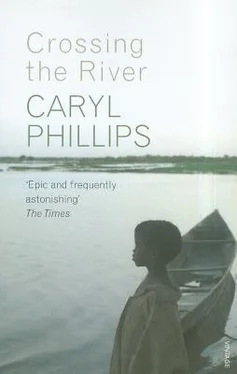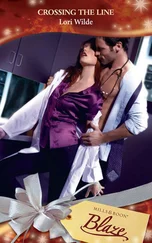Caryl Phillips - Crossing the River
Здесь есть возможность читать онлайн «Caryl Phillips - Crossing the River» весь текст электронной книги совершенно бесплатно (целиком полную версию без сокращений). В некоторых случаях можно слушать аудио, скачать через торрент в формате fb2 и присутствует краткое содержание. Год выпуска: 2006, Издательство: Vintage, Жанр: Современная проза, на английском языке. Описание произведения, (предисловие) а так же отзывы посетителей доступны на портале библиотеки ЛибКат.
- Название:Crossing the River
- Автор:
- Издательство:Vintage
- Жанр:
- Год:2006
- ISBN:нет данных
- Рейтинг книги:4 / 5. Голосов: 1
-
Избранное:Добавить в избранное
- Отзывы:
-
Ваша оценка:
- 80
- 1
- 2
- 3
- 4
- 5
Crossing the River: краткое содержание, описание и аннотация
Предлагаем к чтению аннотацию, описание, краткое содержание или предисловие (зависит от того, что написал сам автор книги «Crossing the River»). Если вы не нашли необходимую информацию о книге — напишите в комментариях, мы постараемся отыскать её.
Crossing the River — читать онлайн бесплатно полную книгу (весь текст) целиком
Ниже представлен текст книги, разбитый по страницам. Система сохранения места последней прочитанной страницы, позволяет с удобством читать онлайн бесплатно книгу «Crossing the River», без необходимости каждый раз заново искать на чём Вы остановились. Поставьте закладку, и сможете в любой момент перейти на страницу, на которой закончили чтение.
Интервал:
Закладка:
She could only once remember being this cold. That was on that miserable December day that she had crossed the Missouri, riding in the back of the Hoffmans’ open wagon. When they arrived on the western shore, Martha, by now gaunt and tired, having traveled clear from Virginia with only the briefest of stops, stepped down into the iciness that was a Kansas winter. Did they buy me to kill me? All her belongings dangled in a bundle that she held in one hand. She no longer possessed either a husband or a daughter, but her memory of their loss was clear. She remembered the disdainful posture of Master’s nephew, and the booming voice of the auctioneer. She remembered the southern ladies in their white cotton sun bonnets and long-sleeved dresses, and the poorer farmers who hoped to find a bargain, their bony mules hitched to lame carriages. The trader who had prodded Lucas with a stick bought him for a princely sum. But Martha held on to some hope, for Lucas was a man who never failed to make friends with dogs. He charmed them with his dark, gentle voice. Lucas was not a man to let his body fetch up in flinty, lonely ground. Eliza Mae was sold after Martha. The Hoffmans could no doubt detect in their purchase a powerful feeling towards this girl, so they had bundled Martha into their wagon and left quickly. They had made their transaction, and the festivities would run their natural course without them. Goodbye, everybody. Once they had passed out of sight, the woman offered Martha a lace handkerchief, which Martha ignored.
Within the year, the Hoffmans had decided to sell up and leave Virginia. They had decided to settle outside of the city of Kansas, in a part of the country which was young and promising for pioneers. Good roads provided easy access to the back country, and new arrivants were permitted to purchase land from the United States government at a cost of two dollars an acre. Mr Eugene Hoffman intended to do a little farming on his five-acre homestead, and he had ambitions of building up a herd of forty cattle and a dozen or so hogs. Cleo Hoffman, her training having prepared her for a life of teaching music, mainly the piano, was equally optimistic. Deeply religious people, they were sadly without children. In this Kansas, Martha sometimes heard voices. Perhaps there was a God. Perhaps not. She found herself assaulted by loneliness, and drifting into middle age without a family. Voices from the past. Some she recognized. Some she did not. But, nevertheless, she listened. Recognizing her despair, Mr and Mrs Hoffman took Martha with them to a four-day revival by the river, where a dedicated young circuit rider named Wilson attempted to cast light in on Martha’s dark soul. Satan be gone. The young evangelist preached with all his might, but Martha could find no solace in religion, and was unable to sympathize with the sufferings of the son of God when set against her own private misery. She stared at the Kansas sky. The shield of the moon shone brightly. Still she heard voices. Never again would the Hoffmans mention their God to Martha.
And then one morning, Mr Hoffman called the graying Martha to him. She knew this would eventually happen, for the crops were not selling, and once again the cattle had come back from market. A merciful market where nothing would sell. Martha had overheard them arguing with each other at the dinner table. Mr Hoffman looked at Martha, and then down at his hands which were folded in front of him. ‘We have to go west, Martha. To where there is work for us. Kansas is still too young.’ He paused. ‘We are going to California, but we shall have to sell you back across the river in order that we can make this journey.’ Martha’s heart fell like a stone. No. ‘We shall do all that we can to ensure that you are rewarded with good Christian owners.’ No. He continued to speak, but Martha did not hear a word he uttered. Across the river to Hell. Eventually she asked, ‘When?’ She was unable to tell whether she had cut him off by speaking. Mr Hoffman cleared his throat. ‘Next week, Martha.’ He paused and looked up at her. ‘I’m sorry.’ This appeared to be his way of apologizing and dismissing her at the same time. It was possible that he was sorry. For himself. Martha was not sure if she should or could leave. Then Mr Hoffman climbed to his feet. ‘You can leave, Martha.’
That night, Martha packed her bundle and left the house. For where, she was not sure (don’t care where), being concerned only with heading west (going west), away from the big river (away from Hell), and avoiding nigger traders who would gladly sell her back over the border and into Missouri. The dark night spread before her, but behind the drifting clouds she knew the sky was heavy with stars. (Feeling good.) And then Martha heard the barking of dogs, and she tumbled into a ditch. (Lord, give me Lucas’s voice.) She waited but heard nothing, only silence. (Thank you.) Eventually, Martha climbed to her feet and began to run. (Like the wind, girl.) Never again would she stand on an auction block. (Never.) Never again would she be renamed. (Never.) Never again would she belong to anybody. (No sir, never.) Martha looked over her shoulders as she ran. (Like the wind, girl.) And then, later, she saw dawn announcing its bold self, and a breathless Martha stopped to rest beneath a huge willow tree. (Don’t nobody own me now.) She looked up, and through the thicket of branches she saw the morning star throbbing in the sky. As though recklessly attempting to preserve its life into the heart of a new day.
The woman poured Martha another glass of water, which Martha held tightly, as though trying to pull some heat from the wet glass. Still cold. She stared at Martha, who noticed now that this woman had the defensive, watchful eyes of a person who had never lost control of herself. The woman loosened her shawl, revealing a gold necklace at her throat. Still cold. ‘Should I leave you now?’ Beneath the hat, Martha could detect a shock of gray hair, but she was unclear as to whether or not the woman was trying to conceal it. Then somebody moved outside, their shadow darkening the line of light at the bottom of the closed door, their weight firing the floorboards. No. Martha’s breath ran backwards into her body. For a moment, she was unsure if she would ever have the power to expel it and then, against her will, she burst in a quiet sigh. Eliza Mae. Come back for her? ‘Shall I leave you now?’ ‘No.’ Martha released the word, without quite understanding why she had done so. Then, as the woman sat on the edge of the mattress, and Martha felt the bed lurch beneath her, she regretted the generosity of her invitation. The woman was making herself at home.
I put down the plates in front of these men and stand back. They do not take their eyes from me. ‘Thank you, ma’am.’ The one with the blue eyes speaks quietly. The other two are in his shadow. They all dress alike in fancy attire; silver spurs, buckskin pants, and hats trimmed with rattlesnake skin. These three unshaven men, who sit uncomfortably in my restaurant. My other customers have left. They have driven away my customers. The truth is, there was only one other customer. These days, I am lucky to set eyes on more than six or seven a day. Colored men don’t appear to be riding the trail like they used to. Coming in here with their kidneys and lungs all ruined, spitting blood, arms and legs broken over and over. Even the toughest of them lasted only a few years, but now it looks like their day is done. ‘Anything else I can get you?’ They still haven’t touched their food. ‘When’s he due back, ma’am?’ I run my hands down the front of my dress. They are more worn than ever, not just from the cooking, but from the washing and cleaning. It is almost ten years now since I arrived in Dodge and set up laundering clothes, then cooking some, then doing both when Lucy agreed to come in and help me out. ‘He’ll be back at dusk.’ My mind turns to Lucy in the back. Waiting for me. Needing my help. We have a large order of washing needs finishing up before morning. ‘Dusk?’ He lets the word fall gently from his lips, as though he were the first man to coin such a term. I nod.
Читать дальшеИнтервал:
Закладка:
Похожие книги на «Crossing the River»
Представляем Вашему вниманию похожие книги на «Crossing the River» списком для выбора. Мы отобрали схожую по названию и смыслу литературу в надежде предоставить читателям больше вариантов отыскать новые, интересные, ещё непрочитанные произведения.
Обсуждение, отзывы о книге «Crossing the River» и просто собственные мнения читателей. Оставьте ваши комментарии, напишите, что Вы думаете о произведении, его смысле или главных героях. Укажите что конкретно понравилось, а что нет, и почему Вы так считаете.












